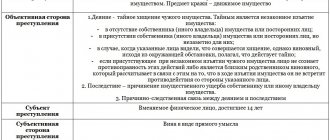ST 203 of the Criminal Code of the Russian Federation.
1. Commitment by a private detective or an employee of a private security organization who has a private security guard certificate of actions that go beyond the powers established by the legislation of the Russian Federation regulating the implementation of private security and detective activities, and which entailed a significant violation of the rights and legitimate interests of citizens and (or) organizations or legally protected interests of society or the state - is punishable by a fine in the amount of one hundred thousand to three hundred thousand rubles, or in the amount of the wages or other income of the convicted person for a period of one to two years, or by restriction of freedom for a term of up to two years, or by forced labor. for a term of up to two years with deprivation of the right to hold certain positions or engage in certain activities for a term of up to three years or without it, or imprisonment for a term of up to two years with deprivation of the right to hold certain positions or engage in certain activities for a term of up to two years.
2. The same act, committed with the use of violence or the threat of its use, or with the use of weapons or special means and entailing grave consequences, is punishable by imprisonment for a term of up to seven years with deprivation of the right to hold certain positions or engage in certain activities for a term of up to three years.
Arbitrage practice
Cases like this are rarely heard in court.
However, there are enough examples in judicial practice. Thus, the Shchelkovsky District Court of Moscow found a private security company employee guilty of the following actions:
- violation of instructions;
- carrying out actions that go beyond the scope of competence;
- beating a citizen who entered the territory of a protected facility and attempted to commit theft.
For the actions committed, the guard received a cumulative punishment in the form of a fine.
Each committed act may be considered by the court as a separate offense. Therefore, the presiding officer has the right to assign sanctions in aggregate.
However, in the presence of mitigating circumstances and reconciliation of the parties, the offender has the right to avoid criminal liability.
what the law says about abuse of power
The use by the person specified in the previous paragraph of his powers contrary to the interests (necessarily legitimate interests) of this organization in order to obtain benefits for himself and other persons or cause harm to other persons, if these actions or inactions lead to causing significant harm to the rights and legitimate interests of citizens, organizations, society or state is punishable by:
- from a fine to imprisonment for a maximum term of 4 years;
- if the abuse resulted in grave consequences, the maximum term of imprisonment may be ten years.
The main object of this crime is the normal activities of commercial or other organizations and their legitimate interests.
An additional object of the crime is the rights and legitimate interests of citizens, organizations, society or the state.
Typical examples of abuse of power.
1. One of the typical examples of abuse of power is the situation when the general director of a company creates an organization (often with a similar name) with his participation, to which he transfers part or all of the orders and clients from the company in which he was or continues to be the general director. At the same time, an unscrupulous general director often does not stop there: lease agreements for offices and retail space are terminated and new ones are concluded with an organization controlled by him, employees are transferred to work in a new company. The old organization actually ceases operations or, at best, loses part of its business.
In this case, the victim can be both the organization itself, which has become the object of criminal actions, and the participants of the organization. Moreover, according to established judicial practice, the applicant in such cases can be a new general director, a member of the board of directors or a member of the company.
2. Another example may be the conclusion by the general director of a transaction on behalf of the organization on terms that are unfavorable in advance, at undervalued or inflated prices, often without agreement with the participants of the company, with counterparties who are in one way or another controlled by the criminal, as a result of which the organization receives losses, and third parties or the general director himself benefit. (see Cassation ruling of the Rostov Regional Court in case No. 22-9035 dated October 28, 2010, Cassation ruling of the Rostov Regional Court in case No. 22-6998 dated September 19, 2012)
3. The third typical example of abuse of power is the situation when the general director or head of a department signs on behalf of the organization a certificate of completion of work with a counterparty, thereby accepting the work and creating the basis for the counterparty to receive payment. At the same time, the criminal knows that the work was not performed or was performed poorly and should not be accepted. (See Cassation ruling in case No. 4994 of the Rostov Regional Court.)
Distinguishing abuse of power from theft.
Abuse of authority (Article 201 of the Criminal Code of the Russian Federation) should be distinguished from theft: Fraud (Article 159 of the Criminal Code of the Russian Federation), Fraud in the field of entrepreneurial activity (Article 159.4 of the Criminal Code of the Russian Federation), Misappropriation or embezzlement (Article 160 of the Criminal Code of the Russian Federation).
Both in case of abuse of power and in case of theft, an organization can lose its property, and therefore, in practice, problems of qualification and differentiation of these groups often arise.
- The main feature that distinguishes abuse of power from various types of theft is intent. In case of abuse of power, the intent is aimed at using powers contrary to the interests of the organization for one’s own benefit or the benefit of others. In the case of theft, the intent is aimed at stealing property and obtaining it at one’s disposal or transferring it to the disposal of other persons. An example from judicial practice is the Supervisory ruling of the RF Armed Forces dated March 6, 2002. in case No. 5-D01-365.
- Another sign that distinguishes abuse of power from theft using official position is the nature of the seizure of property: in case of abuse of power, the property is either not confiscated, or is confiscated, but temporarily and/or for a fee. (Resolution of the Plenum of the Armed Forces of the Russian Federation No. 19 of October 16, 2009).
Characteristics of the objective side
According to Article 203 of the Criminal Code of the Russian Federation, the objective side of the illegal act in question is expressed in the excess of the powers established by law and granted by the relevant license, contrary to the objectives of this type of service.
In accordance with the law, private detectives are prohibited from hiding facts that have become known to them about committed or impending crimes from law enforcement agencies, as well as impersonating police officers and collecting information related to the personal life, religious and political beliefs of individual citizens.
Thus, the perpetrators may be talking about abuse of authority (this is also mentioned in the comments to Article 203 of the Criminal Code of the Russian Federation) if actions prohibited by law are committed (using violence or threats), as well as if the committed acts go beyond the rules defined in a license for the right to carry out activities (security and detective). Any activity of this kind is contrary to the tasks of security or detective services. The powers of a security guard or detective are specified in contracts concluded with clients.
The composition of the article is material. In other words, in order for a crime to be considered completed, a socially dangerous consequence must occur.
Judicial practice under this article
Article 203 of the Criminal Code of the Russian Federation “On Abuse of Power” is rarely used, but it does occur.
Examples of judicial practice on it:
- Citizen G. worked as the head of a private security service. After drinking, he went to work. At this time, a woman came to the office who was dissatisfied with the work of his employees. They quarreled, G. swung his hand and hit the client in the face. She fell and cut her eyebrow. She appealed to the court with a request to punish the culprit. After the investigation, G. appeared in court. He admitted that he had done wrong and apologized. He was sentenced to pay a fine and was deprived of his position.
- Citizen Sh. had a private detective's license and worked with several clients. As part of his job, he needed to keep an eye on his client's wife. One day he was performing his duties, and the client’s wife was attacked. He began to defend her, used a firearm, the criminal was wounded, detained, but sued for causing harm to health. The court considered all the features of the case, took into account that Sh. had a license and the right to carry weapons, considered him not guilty of criminal liability, but ordered him to pay for the treatment of the victim.
- Citizen K. worked for a private security company. His duties included protecting the deputy and ensuring his immunity. One day, he and his client attended a rally; journalists surrounded the deputy and began asking for an interview. He refused and asked K. to help him get through. He accidentally hit the journalist, he fell and broke the camera, and filed a lawsuit. The investigation considered that K. did not exceed his powers and was therefore innocent.
What decisions are made under Article 203?
More often, it results in convictions because some detectives and security guards take their duties too literally. In 2021, there were 11 cases under this article, of which 7 were in 1 part. As a result, 2 people were acquitted, 1 was deprived of liberty, 2 received suspended imprisonment, 5 received restriction of freedom, 2 received a fine. 1 person received compulsory work and another 1 was declared insane.
What are aggravating and mitigating circumstances?
Aggravating circumstances in the form of the use of violence or its threat, or the use of weapons can increase the punishment for a private security guard or detective. Mitigating circumstances are also taken into account separately, a general list of which is given in the code.
Object characteristics
The object of the crime, qualified under Article 203 of the Criminal Code of the Russian Federation, is the procedure established by the legislator for performing private security and detective activities. In addition, it includes the health of citizens who are harmed as a result of illegal actions of employees of these organizations.
Please note that you can familiarize yourself with the procedure in accordance with which private activities (detective and security) should be carried out in the Law of the Russian Federation No. 2487-1, adopted on March 11, 1992.
Art. 203 of the Criminal Code of the Russian Federation
Article 203 of the Criminal Code of the Russian Federation regulates relations in the event that the powers of a detective or security guard have been exceeded. The legislator says that criminal liability occurs if the actions of the above persons violate the rights and legitimate interests of other people.
In addition to the interests of citizens, a detective or security guard who abuses his official powers infringes on rights and organizations.
For exceeding his powers by a security guard or other person, criminal liability is provided.
The sanctions imposed by the presiding officer depend on the severity of the act. The legislator provides for the following punitive measures:
- fine - its size varies from one hundred to three hundred thousand rubles. As a payment, deprivation of the offender’s income for a maximum of 2 years is considered;
- forced labor - the period of work is set for a maximum of 2 years. As an additional punishment, along with work, a sanction is applied in the form of a ban on holding positions established by the court and engaging in activities prohibited by the presiding judge;
- deprivation of freedom for up to 7 years - this punishment is applied if security or a detective used violence against a citizen.
These sanctions are equivalent to the harm that the offender causes to society through his actions.
The court has the right to temporarily revoke a license permitting detective or security activities.
Description of a simple composition
The first part of the criminal law describes the simple elements of the crime. It occurs when an employee of a private security organization (provided he has the appropriate identification) or a private detective carry out actions that go beyond the scope of their powers established by law, and thereby significantly violate the legitimate interests and rights of legal entities and individuals, or the interests states and (or) societies protected by law.
If qualified under part one of Article 203 of the Criminal Code of the Russian Federation, the offender faces punishment in the form of:
- a fine in the amount of 100 to 300 thousand rubles. or in the amount of any income of the convicted person, including salary, for a period from 1 to 2 years;
- restrictions of freedom for a period of up to 2 years;
- forced labor (up to 2 years) with aggravation in the form of deprivation of the right to hold a post in a certain position or perform any specific labor activity for a period of up to 2 years.
Another comment on Article 203 of the Criminal Code of the Russian Federation
1. The objective side of the crime is characterized by actions that go beyond the powers established by the legislation of the Russian Federation regulating the implementation of private security and detective activities.
Exceeding authority occurs if the person did not have the right at all or could perform these actions, but in the presence of special conditions specified in the law or by-law and absent in this situation. Thus, it is prohibited to use firearms against women, persons with obvious signs of disability and minors, when their age is obvious or known to the guard, except in cases of armed resistance, an armed or group attack that threatens the life of the guard or the protected property, as well as in cases of significant crowds of people, when unauthorized persons may suffer from the use of weapons (Article 18 of the Law of the Russian Federation of March 11, 1992 N 2487-1 “On private detective and security activities in the Russian Federation” <1>).
——————————– <1> Gazette of the SND and the Armed Forces of the Russian Federation. 1992. N 17. Art. 888.
The consequences of abuse of power are a significant violation of the rights and legitimate interests of citizens and (or) organizations or legally protected interests of society or the state (for example, these include: violation of the rights of citizens to the inviolability of their home; the secrecy of correspondence, telephone conversations, postal, telegraph and other messages; concealment from law enforcement agencies of facts of impending, ongoing or committed crimes that have become known to them).
A causal connection must be established between the act committed and the consequences that occurred.
2. The subjective side of the crime is characterized by intent; a careless form of guilt is possible in relation to grave consequences (Part 2 of Article 203).
3. Special subject of the crime - a private detective or an employee of a private security organization.
A private detective is a citizen of the Russian Federation, registered as an individual entrepreneur, who has received a license in the prescribed manner to carry out private detective (detective) activities and provides the corresponding services.
The right to acquire the legal status of a private security guard is granted to citizens who have undergone professional training and passed a qualification exam, and is confirmed by a private security guard certificate. The procedure for passing the qualification exam and issuing a private security guard certificate is established by the Government of the Russian Federation. A private security guard works under an employment contract with a private security organization, and his work activities are regulated by labor and other legislation.
4. Criminal liability for a crime increases if violence or the threat of its use was used in the process of its commission (Part 2 of Article 203). Violence is beating, causing minor and moderate harm to health (Part 1 of Article 112 of the Criminal Code), torture, physical restraint, restriction of freedom, and a threat can be expressed in the threat of murder or causing serious harm to health. The threat must be perceived by the victim as real.
5. The grave consequences of the crime in question (Part 2 of Article 203) can be, for example, the death of a person, the infliction of grievous harm to health, the infliction of moderate harm to the health of many persons. At the same time, the intentional infliction of serious harm to health or death of another person requires additional qualification for a set of crimes.
Article 203. Interruption of the limitation period
Ruling of the Supreme Court of the Russian Federation dated January 28, 2019 N 309-ES18-24337 in case N A60-17512/2018 The circumstances with which the plaintiff associates the interruption of the limitation period were assessed by the courts in relation to Article 203 of the Civil Code of the Russian Federation and its judicial interpretation. The applicant’s argument about the applicability of the explanations given in 2001 on the procedure for applying the rule, which has been in force since 2013 in an amended version, is subject to rejection as not based on the norms of the current procedural law. In addition, the assessment given by the lower courts to the plaintiff’s arguments about the defendant’s recognition of the disputed debt is not subject to review in the cassation court, which is not vested with the authority to investigate and establish the circumstances of the dispute.
Ruling of the Supreme Court of the Russian Federation dated April 29, 2019 N 307-ES19-4512 in case N A05-5197/2018
Refusing to satisfy the claims in part on the grounds of missing the statute of limitations, the courts were guided by Articles 195, 196, 199, 200, 203, 204 of the Civil Code of the Russian Federation and proceeded from the fact that the partnership in March 2015 knew about the amounts collected and withheld by the enterprise for the period before 2014, while the statement of claim is dated 04/24/2018. The courts did not establish any actions indicating recognition of the debt.
Determination of the Judicial Collegium for Civil Cases of the Supreme Court of the Russian Federation dated September 10, 2019 N 49-KG19-28
At the same time, the court did not take into account that, in accordance with Article 203 of the Civil Code of the Russian Federation, the limitation period is interrupted by filing a claim in the prescribed manner, as well as by the obligated person performing actions indicating recognition of the debt. After a break, the limitation period begins anew; the time elapsed before the break is not counted towards the new period.
Determination of the Constitutional Court of the Russian Federation dated September 30, 2019 N 2386-O
As for paragraph 2 of Article 196, paragraph 3 of Article 199, paragraphs 2 and 3 of Article 200, Articles 202 and 203 of the Civil Code of the Russian Federation, their application by the materials presented by the applicant in a specific case with his participation is not confirmed, and therefore his complaint in this part also cannot be considered admissible within the meaning of Articles 96 and 97 of the Federal Constitutional Law “On the Constitutional Court of the Russian Federation.”
Ruling of the Supreme Court of the Russian Federation dated October 16, 2019 N 310-ES19-13396 in case N A68-12820/2017
Having examined the factual circumstances of the case, evaluating the evidence presented in the case, guided by Articles 199, 203, 207, 330 of the Civil Code of the Russian Federation, the explanations contained in the resolution of the Plenum of the Supreme Court of the Russian Federation dated September 29, 2015 N “On some issues related to the application of the norms of the Civil Code of the Russian Federation on Limitation of Claims,” the courts partially satisfied the plant’s demand for a penalty.
Ruling of the Supreme Court of the Russian Federation dated October 15, 2019 N 305-ES19-18252 in case N A40-66077/2018
Having assessed the evidence presented in the case and refusing to satisfy the claim, the courts were guided by Articles 195, 196, 199, 200, 203, 204, 205, 206 of the Civil Code of the Russian Federation, the explanations contained in paragraphs 1, 12 of the resolution of the Plenum of the Supreme Court of the Russian Federation dated 09/29/2015 N “On some issues related to the application of the provisions of the Civil Code of the Russian Federation on the limitation period”, and proceeded from the plaintiff’s omission of the limitation period, indicating that the Anakat company, which entered into a lease agreement, as of 08/30/2011 did not may not have known that the defendant in the claim for damages is the owner of the building; the presence of circumstances indicating a break, suspension or stop of the limitation period has not been proven.
Ruling of the Supreme Court of the Russian Federation dated October 22, 2019 N 301-ES19-18410 in case N A43-26750/2018
In refusing to satisfy the claim, the courts were guided by Articles 196, 200, 203, 309, 310, 539, 541 of the Civil Code of the Russian Federation, having examined and assessed the evidence presented in the case according to the rules of Article 71 of the Arbitration Procedural Code of the Russian Federation, they came to the conclusion that the plaintiff missed the three-year the limitation period, the application of which during the consideration of the case in the court of first instance was declared by the defendant, in the absence of evidence of interruption of the running of such period due to the recognition of the debt.
Ruling of the Supreme Court of the Russian Federation dated November 5, 2019 N 309-ES19-20247 in case N A71-14609/2018
In resolving the dispute in this case, the courts, guided by the provisions of Articles 195, 196, 200, 203, 309, 702, 708, 720 of the Civil Code of the Russian Federation, paragraph 20 of the resolution of the Plenum of the Supreme Court of the Russian Federation dated September 29, 2015 N “On some issues related applying the norms of the Civil Code of the Russian Federation on the limitation period", having examined and assessed in accordance with Article 71 of the Arbitration Procedural Code of the Russian Federation the evidence available in the case, establishing the fact of the plaintiff’s performance of work, the presence of debts on payment from the company, recognizing the letter sent by the company guaranteeing payment RUB 4,200,000 before 12/14/2015, adequate evidence of the defendant’s recognition of the debt, they rightfully came to the conclusion that the statement of claim was filed on 08/21/2018 in compliance with the statute of limitations and the existence of grounds for its satisfaction.
Ruling of the Supreme Court of the Russian Federation dated November 11, 2019 N 310-ES19-20054 in case N A54-6185/2016
Canceling the ruling of the court of first instance and refusing to satisfy the requirements, the appellate court, having re-evaluated the evidence presented in the case according to the rules of Chapter 7 of the Arbitration Procedural Code of the Russian Federation and guided by the provisions of Articles 100, 142 of the Federal Law of October 26, 2002 N 127-FZ “On Insolvency” (bankruptcy)", Articles 179, 181, 195, 196, 199, 200, 203, 204 of the Civil Code of the Russian Federation, taking into account the explanations set out in paragraphs 20, 27 of the resolution of the Plenum of the Supreme Court of the Russian Federation dated September 29, 2015 N "On some issues , related to the application of the provisions of the Civil Code of the Russian Federation on the limitation period”, proceeded from the pass of K.I. Poraiko. the limitation period for the stated claim, as stated by the bankruptcy trustee of the debtor and which is an independent basis for refusing to satisfy the application.
Ruling of the Supreme Court of the Russian Federation dated November 13, 2019 N 308-ES19-20313 in case N A53-25811/2018
The courts of the first and appellate instances, having examined and assessed, according to the rules of Article 71 of the Arbitration Procedure Code of the Russian Federation, the evidence presented in the case materials, guided by Articles 125, 126, 195, 196, 199, 200, 203, 1102, 1105, 1109 of the Civil Code of the Russian Federation (hereinafter - the Civil Code RF), Articles 6, 9, 158, 242.2 of the Budget Code of the Russian Federation, decision of the Rostov-on-Don City Duma dated June 21, 2011 N 138 “On approval of the Regulations on sectoral (functional) bodies of the administration of the city of Rostov-on-Don”, clarifications , given in paragraph 1 of the resolution of the Plenum of the Supreme Arbitration Court of the Russian Federation dated 06/22/2006 N “On some issues of the application by arbitration courts of the norms of the Budget Code of the Russian Federation”, in paragraphs 20, 21 of the resolution of the Plenum of the Supreme Court of the Russian Federation dated 09/29/2015 N “On some issues related to the application of the provisions of the Civil Code of the Russian Federation on the limitation period”, came to the conclusion that the Company’s claim was justified.
Determination of the Judicial Collegium for Civil Cases of the Supreme Court of the Russian Federation dated 05.11.2019 N 4-КГ19-60, 2-1037″Л”/2018
Satisfying the bank's claims in part, the appellate court referred to the provisions of paragraph 2 of Article 203 of the Civil Code of the Russian Federation, indicating that the statute of limitations had not expired due to its suspension during the pre-trial settlement of the dispute. Meanwhile, paragraph 3 of Article 202 of the Civil Code of the Russian Federation establishes that if the parties have resorted to the procedure for resolving the dispute out of court provided for by law (mediation procedure, mediation, administrative procedure, etc.), the running of the limitation period is suspended for the period established by law to carry out such a procedure, and in the absence of such a period - for six months from the date of commencement of the relevant procedure.





